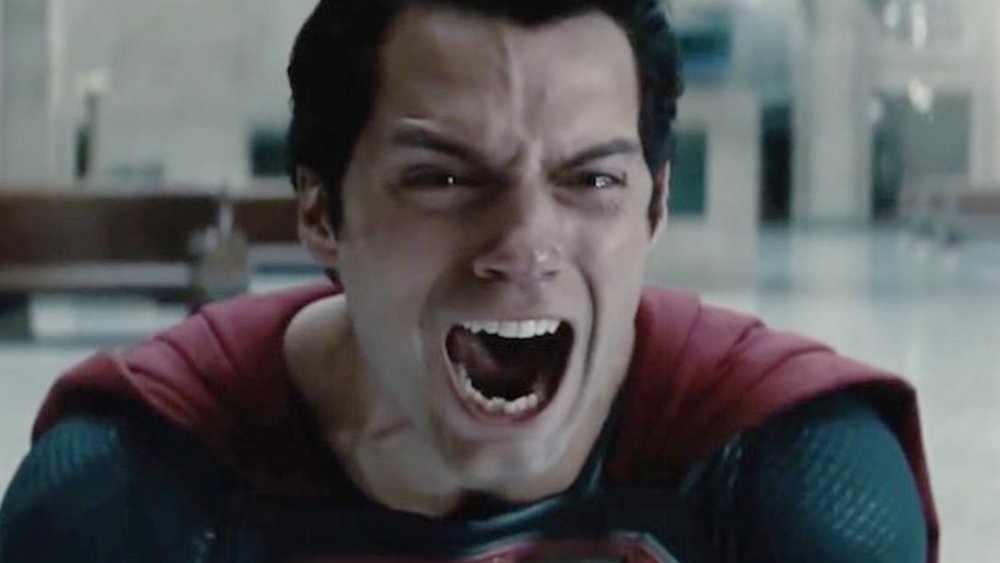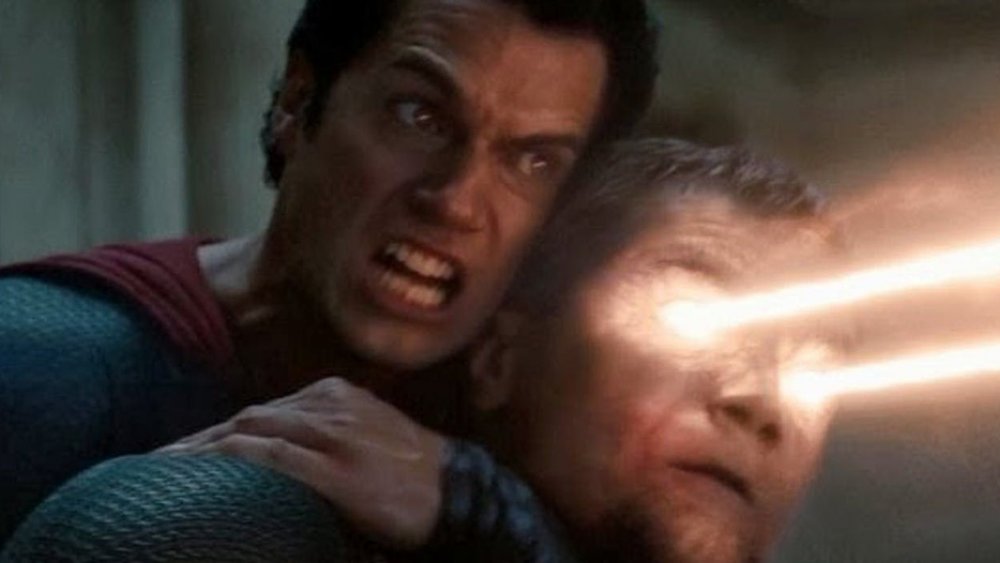Man Of Steel's Alternate Ending Could Have Changed Everything
A Man of Steel by any other ending may have been less controversial.
When Warner Bros. and DC Entertainment unleashed director Zack Snyder's Man of Steel unto the world in June 2013, Superman fans were ... surprised. While some found fault with the film's stop-and-start pacing, its arguably joyless tone, and the general lack of fun that's often associated with comic book movies, the frequent, excessive violence is what had many viewers squirming in their seats. The biggest jaw-dropper of Man of Steel? Its ending, which found Superman (played by the dashing Henry Cavill) being forced to kill General Zod (Michael Shannon), the Kryptonian who wanted to reform Earth into a new Krypton and serve as its ruler.
The ending of Man of Steel was highly divisive — with some feeling that it was "ridiculous," others arguing that worked against Superman's morals, and some stating that it actually made sense in the grand scheme. But the movie could have ended another way.
During a Comic-Con@Home panel held on Saturday, July 25, 2020, Man of Steel screenwriter David S. Goyer spoke about the film's alternate ending, in which Clark Kent didn't kill General Zod. That ending was meant to serve as a backup in case Goyer and Snyder didn't want to go through with having Superman commit murder.
"The idea was that Superman would — there was one of those sort of cryopods on the ship that ends up becoming the Fortress of Solitude that he's able to put Zod back into and then throw out into space," Goyer told the panel's host, Backstory Magazine publisher Jeff Goldsmith.
He then admitted that "maybe some people would've been happier" with the alternate ending of Man of Steel, which could have significantly altered the public perception of the film. However, there's an important reason why Goyer and Snyder didn't play it safe. As Goyer explained, "It felt like a cop-out for the story that we were telling."
This wasn't the only scene that didn't make it into the theatrical cut of Man of Steel. Goyer also shared that he wrote a scene in which a young Clark and his adoptive father Jonathan Kent (Kevin Costner) go hunting. This would have, according to Goyer, foreshadowed Superman's murder of General Zod — which he didn't do willingly.
"Ironically, there was a scene we wrote that didn't get filmed, in which Jonathan takes young Clark hunting and they kill a deer, and young Clark is just gutted by the act," said Goyer. "Jonathan says, 'It's a powerful thing to take a life, even if you're forced to take a life.' That was a scene that didn't make it into the final movie. We never filmed it."
Christopher Nolan initially rejected Man of Steel's ending
Goyer and Snyder were in agreement that Superman should go through with snapping Zod's neck at the end of Man of Steel, even though it went against the hero's "no killing" rule. However, one key member of the film's team had a tough time getting on board: Christopher Nolan, who produced Man of Steel. Speaking with Empire Magazine in June 2013 (via Huffington Post), Goyer dished on Nolan's initial disagreement.
"Killing Zod was a big thing, and that was something [about which] Chris Nolan originally said, 'There's no way you can do this," said Goyer, detailing that when he and Snyder came up with the idea of Superman being forced to murder Zod rather than doing it out of his own volition, things fell into place. "We said, 'But what if he didn't have a choice?' Originally, Chris didn't even want to let us try to write it. Zack and I said, 'We think we can figure out a way that you'll buy it.' [...] I wrote the scene and I gave it to Chris and he said, 'Okay, you convinced me. I buy it.'"
And that's the way the comic book movie cookie crumbled.
Back on the Comic-Con@Home panel, Goyer said that Superman's murder of Zod in Man of Steel was meant to establish his no-kill rule from that point forward within the DC cinematic universe. "He was in this terrible position, and then afterwards, he vowed that he could never do it again," the screenwriter said. "It didn't come out of anger — he was forced into it — but that was the one."

